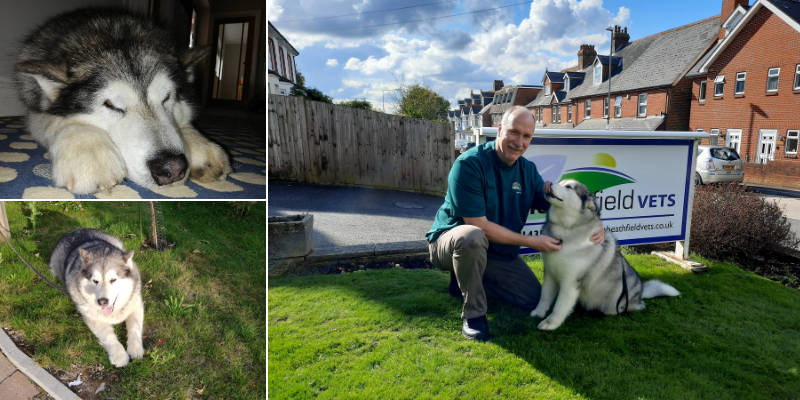
Marnie suffers from a condition called hypothyroidism. Her story began with a routine appointment after she started displaying some gradual abnormal symptoms and this has lead to a confirmed diagnosis and treatment which has greatly improved her quality of life.
“My Alaskan Malamute Marnie started breathing heavily and snoring at night. She was also very lethargic. This combined with her reluctance to go for walks and weight gain started to worry me. I booked into to see Gerald who was absolutely brilliant. He took time to talk to me and ask lots of different questions and try to work out what the problem could be. He suspected a thyroid problem and ordered blood tests. They came back really quickly and Gerald’s suspicion was absolutely right.
Marnie started the medication and I was also strict with her food and snacks. In just a week she was starting to lose weight and get her energy back and two weeks later she had lost around 10kgs. Now a couple of months into her treatment she is actually wanting to run which is absolutely fantastic. I can’t thank Gerald and Heathfield Vets enough for the speedy diagnosis and excellent treatment.” – Suzi, Marnie’s Owner
What is hypothyroidism?
The thyroid gland is found beside the windpipe and produces a hormone that regulates the body’s metabolism. Hypothyroidism is a clinical condition whereby the thyroid is underactive and does not produce enough hormones. This results in a slower metabolism, affecting all the organs of the body.
Hypothyroidism is very rare in cats (they suffer more commonly from overactive thyroids) but is a relatively common disease in middle aged dogs. Whilst the illness can affect all breeds, it is most prevalent in Golden Retrievers, Doberman Pinschers, Setters and Cocker Spaniels.
What causes hypothyroidism?
The disease is most commonly caused by an overactive immune system causing destruction of the thyroid gland. Less commonly it can have a congenital cause.
What are the symptoms?
- Thinning of the fur and a dull look to the coat
- Weight gain and lethargy
- Thickening of the skin
- Flaky skin and dark patches
- Drooping facial muscles
- Increased risk of ear infections
- Intolerance to cold weather
How is it diagnosed and monitored?
Hypothyroidism is diagnosed with a blood test and patients will need to return regularly for follow up blood tests in order to adjust medication doses and monitor the pet’s condition and progress.
What is the treatment?
Hypothyroidism has no cure but can be managed with lifelong medication. Replacement hormones are administered and usually after 4-6 weeks symptoms such as thinning fur will subside. In Marnie’s case she lost weight and regained her love of running and playing with other dogs. Affected dogs usually go on to lead normal lives with treatment and regular checkups with their vet.
Chronic conditions such as hypothyroidism also highlight the importance of good insurance for your pets, particularly as they get older. Chronic conditions account for some of the most claimed for conditions with insurance companies.
“My insurance company has been brilliant and your team has been very helpful with the administration and submitting the claims for me. Everything was stress free so I just had to worry about Marnie getting better and not think about the cost of treatment and medication” – Suzi, Marnie’s owner
We always encourage our clients to get the best insurance they can for their pets; take a look at our guides to insurance for advice about getting your pet insured, no matter what their age or circumstances. Our team is always happy to answer any questions you may have.
We are so pleased with Marnie’s progress, she’s a much happier dog with a much happier owner!
If you would like to have your pet’s story featured, contact us.

